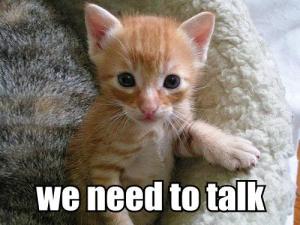I have some gaps in my knowledge of classic movies. My parents were really strict with what we could watch growing up, and once they loosened the reins a bit, I was way too busy caring about playing sports to bother with petty things like the how the history of our cinema is really the history of us. I was trying to win sport games!
I’ve made up a lot of lost ground, but there are, of course, still gaps in my film history. I think this may influence my understanding of what does and does not make a “good” movie. My ignorance leads to situations like the one I had last night, where I had this actual phone conversation with my friend Mandy:
Mandy: (describing her experience watching the Oscar-nominated film Amour) I don’t think I’ve ever had an experience like that watching a film. I was misty-eyed the entire time. It was so intense and so sad, but it was such a perfect picture of love and the inevitability of death. The love in that movie is the kind of love I hope my married friends have.
Me: I’ve only had an experience with a movie like that once. Actually, I think it was something we watched together in college. Do you remember John Tucker Must Die?
[Okay, okay, I admit it: this conversation actually did happen, but it was obviously a joke. I would never be friends with someone who watched French films. And did you know that the main characters are like, really old? Gross.]
But I closed another gap this last week: I finally saw The Godfather and The Godfather: Part II. We didn’t watch The Godfather: Part III because I’m pretty sure Herman Cain had a role in that one, and I heard there’s this ridiculous scene where Michael goes, “I’m going to make him an offer he can’t refuse,” and Herman goes, “We are still talking about Pokemon, correct?” And plus, can you imagine how Herman would treat the women in that film? I bet he’d turn them into total caricatures, like, every woman would either be a virgin or a prostitute or someone’s mother. Can you imagine?
Of course, I knew some of the classic moments before watching either of the movies. I was most excited to see the “leave the gun; take the canoli” scene, as it was such a gutsy move: a before-its-time-guns suck-carbs-rule jab at both the NRA and the Atkins’ diet?! I hear that Francis Ford Coppola had to deal with blowback for that particular act of political suicide for years, most notably having to live to see his daughter direct Lost in Translation.
I was confused about some of the other scenes, though. Sure, I had heard all about this whole “hoarse in bed” thing, but I was like, well, that really doesn’t sound like a very big deal, couldn’t the guy have just taken some Nyquil? Turns out it was something different.
But overall, I think I reacted to the movies the same way that most red-blooded Americans do: it got me thinking about the grammar of last names.
The whole Godfather franchise revolves around different families: most notably, the Corleone family. And sure, as movie viewers, we get to see dumb surface-y things like the juxtaposition of the descent into evil and the ascent into power, and what the family and individual looks like at the point of intersection; but what we DON’T see are all the behind-the-scenes stuff, like the infamous deleted scene where Fredo is trying to send the annual family Christmas letter, and he’s all like, “Hey, pop! I know I can just sign this ‘The Corleones,’ but what would we do if our name ended with a ‘y’? Oh my god, what would we do if our name ended with an ‘s’? Hey, pop, real quick while I got your attention, do you love Michael more than me? Also, what do we do about apostrophes?”
Of course, we never get any response because Don Corleone is too busy stuffing acorns into his cheeks to prepare for winter.
But don’t worry, Fredo. I’ve got the answers for you. Come on, let’s get in the boat and go out on the lake and talk about it.
Basic Pluralizations
To pluralize a last name, you keep the name intact. For most last names, you can just add an -s. Brown becomes Browns. Miller becomes Millers.
If the last name ends with a -y, resist the temptation to change it to -ies for the plural. The last name Cassidy would NOT be pluralized as “the Cassidies.” Just add the -s, as in, “The Cassidys are pleased to invite you over for a special screening of Butch Cassid–hey, wait, THAT’S OUR NAME!”
Tricky Pluralizations
English is ridiculous. That’s what you need to remember.
So, if the last name ends with an -s, -x, -z, -ch, or -sh, you need to add an -es to make it plural. So that means you need to write things like:
-The Williamses love you
-The Xeroxes hope they didn’t copy your idea for a Superbowl party
-The Roaches hate sunlight
Possessive Form
Don’t make it more complicated than it needs to be. You don’t need to be adding stray s’s all over the place. You’re going to run into one of four situations. Here they are:
1. A basic last name like Brown or Tatum. If you aren’t making the name plural, then you only add an apostrophe + s. For example:
Mr. Brown’s car
Mary Tatum’s inferiority complex
2. A last name that you have pluralized because you are referring to more than one member of the family. Take care of the pluralization before you worry about the apostrophe. That’s my #1 tip. Follow the rules above. Brown becomes Browns. Roach becomes Roaches.
No matter what the last name, if you make it plural, it will end in ‘s.’ Don’t be frightened. Once you have made it plural, just tack on an apostrophe at the end. Simple as that. You don’t need to add an apostrophe + s. Just the final apostrophe after you’ve pluralized it. So, for example:
The Browns’ annual tree-lighting ceremony was, to be honest, underwhelming.
The Roaches’ way of life was confusing to their neighbors
3. A singular last name that ends with ‘s.’ A last name like “Jones” is what I’m talking about here. Don’t worry – it’s easy! If you are referring to a singular Jones (like Sarah Jones or Professor Jones), follow the rules for a singular possessive above and add the apostrophe + s. It looks like this:
Sarah Jones’s name was boring.
4. The plural form of a name that ends with ‘s.’
This one is fun. You can either use the -es + apostrophe ending, or, my personal favorite: DON’T CHANGE ANYTHING. JUST PUT A FINAL APOSTROPHE AT THE END. Boom. You’re done! Here’s what both would look like:
The Joneses’ Christmas card was ugly. (Option 1)
The Jones’ Christmas card was ugly. (Option 2)
The Edwardses’ family dynamic was strange. (Option 1)
The Edwards’ family dynamic was strange. (Option 2)
I personally favor Option 2. It’s a lot prettier and a lot less confusing, at least to me.
And honestly, I’ve had enough confusion this past week. People talk about how great these Godfather movies are, but no one ever talks about how confusing they can be. During Part II, I kept waiting for Ben Stiller to show up so that he and DeNiro can have that famous “circle of trust” talk, but no dice. And I spent all of Part I thinking that when Marlon Brando kept talking about “an offer he can’t refuse,” he was referring to Target’s Red Card. I mean, 5% off every purchase, no strings attached? How does anyone turn down THAT?
Tags: Al Pacino, Apostrophe rules, Family name possessives, Francis Ford Coppola, Grammar, Herman Cain, John Tucker Must Die, Marlon Brando, Movie grammar, Robert DeNiro, The Godfather


